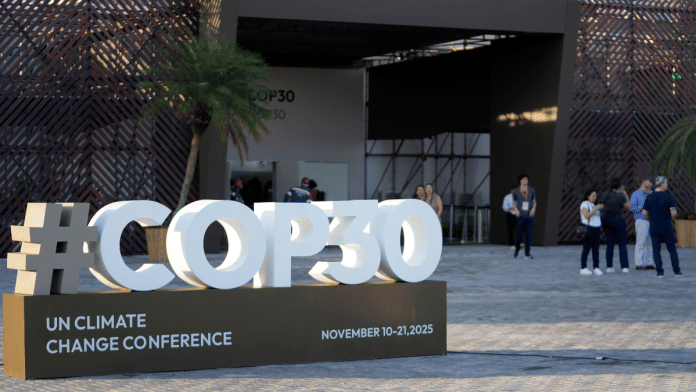New Delhi: Almost a year after US President Donald Trump pulled the US out of the Paris Agreement, the world is waiting to see if China will step up to fill the leadership vacuum in climate governance.
And everybody has an opinion on what it could look like.
Two things stood out as the 30th Conference of the Parties (COP) of the United Nations Framework Convention on Climate Change convened Monday in Brazil’s Belem – the US’s glaring absence and China’s visibility.
From China’s 300-strong delegation, among the largest attending COP30, to affirmative declarations on meeting its net-zero target, experts said the signs are there for Beijing to take up the mantle.
“This might just be a watershed moment for China — climate negotiations have always been dominated by Western norms and values, but now there’s space for China to step in. We might be seeing the beginning of Chinese climate leadership,” said Rajiv Ranjan, associate professor of Chinese studies at Delhi University.
Others said China’s approach to climate change is more pragmatic than most and its national interest always remains its priority.
“Chinese have a rational, scientific approach to the issue of climate change. They are not going to deny it (climate change) in spite of the evidence, like the Americans do. But that does not mean they will sacrifice immediate national interests at the negotiating table,” said Jabin Jacob, an associate professor at Shiv Nadar University who holds a PhD in Chinese studies.
Almost half of China’s energy capacity is met by renewable sources, but the country is also the largest emitter of greenhouse gases. Its increasing dependence on coal over the years prompted others, including the European Union, to push Beijing into doing more. EU’s Climate Commissioner Wopke Hoekstra said in September that the Union will prod Beijing to “go beyond” its existing target for reducing emissions.
Leveraging dominance
Called ‘Implementation COP’ by the Brazilian presidency, global leaders are set to discuss a number of pressing issues at COP30, among them climate financing of $1.3 trillion by 2030 and an incentive mechanism to protect tropical forests world over.
China, it appears, recognises the weight of its presence at the summit.
“Global climate governance stands at a pivotal crossroads ten years after the adoption of the Paris Agreement… US withdrawal from the Paris Agreement has brought major uncertainty,” Wang Yi, Vice-Chairman of China’s National Expert Committee on Climate Change, was quoted as saying by local media ahead of COP30.
Ding Xuexiang, Special Representative of the Chinese President at the COP30 Leaders’ Summit, said Monday, “No matter how the international situation may evolve, China will uphold true multilateralism, and continue to fully support the UN’s core position and role in international affairs.”
China is one of the only major emitters to renew its Nationally Determined Contributions (NDCs) this year – climate action plans submitted by countries — before COP30 began. It committed to reducing emissions by 7-10% and increasing non-fossil fuel energy consumption to 30% of its total by 2035. Although it has been criticised for setting its targets too low, analysts at think-tank Chatham House said Beijing has a habit of “underpromising and overdelivering”.
While it is the world’s largest contributor to carbon emissions, Beijing also declared that the country was on track to achieve net-zero emissions by 2060.
Led by Xuexiang in the absence of President Xi Jinping, the Chinese delegation’s priorities are to ensure a deal is reached on climate financing and funding for loss and damages to developing nations due to climate crisis, according to a database maintained by Carbon Brief.
Further, Beijing is likely to oppose Europe’s policy to impose the Carbon Border Adjusted Mechanism (CBAM) – a move that would essentially put a price on carbon emissions from imported goods.
The country plays a key role in the global shift towards cleaner energy. It accounts for 80% of the world’s solar photovoltaic supply chain (panels, wafers and cells), 60% of electric vehicle sales, and more than 50% of production and refining of critical minerals (lithium, nickel and cobalt) EVs and batteries, according to the International Energy Agency.
“In translating technological advantages into influence in climate governance, I believe China should play a ‘cooperative leadership’ role,” Wang Yi said in the interview.
Hailed as a ‘leader’
There seemed to be wider acceptance of Beijing’s role in climate talks.
The delegation of Brazilian President Lula de Silva arrived at COP30 in Chinese electric vehicles — GWM — on Sunday. And UN Secretary General Antonio Gueterres, at the Leaders’ Summit in Belem on Friday, told Xeuixiang that Beijing was a “leader in global climate governance”.
According to Ranjan, China’s choice of sending Xuexiang — the first Vice Premier, who ranks just below Chinese Premier Li Qiang — to lead negotiations at COP30 indicates just how seriously the country takes the conference.
In contrast, the Trump administration did not send any high-level representatives for the climate talks.
Local media reported that Xuexiang met Silva ahead of the summit to discuss ways to invest in green energy projects in Brazil.
Silva, the report said, “personally” negotiated with the Chinese leader to invest in Brazil’s Tropical Forests Facility, although Beijing is yet to confirm a pledge to the Fund.
The US factor
Aiding China’s visibility in climate negotiations this year was the US’s absence since Donald Trump pulled the country out of the Paris Agreement immediately after taking power and publicly decried climate change as a “con job” in his address before the United Nations General Assembly this year.
“It isn’t just the US’s absence, but also China’s own variety of climate initiatives that show that Beijing is working to surpass the US in climate leadership. Their updated NDCs signal this intent to project seriousness and leadership,” said Sana Hashmi, Fellow at Taiwan Asia Exchange Foundation, a policy think-tank.
(Edited by Prerna Madan)
Also Read: Why EU’s ‘66-72% cut in emissions by 2035’ pledge is being seen as a cop-out ahead of COP-30






